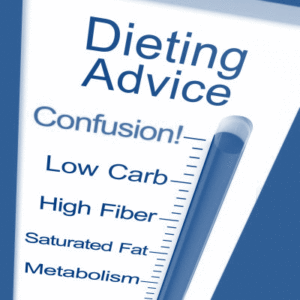Three weeks ago, I explored the Seven Myths of Conventional Medicine as defined by Dr. Mark Hyman, MD and Dr. Mark Luponis, MD in their book, Ultraprevention. This week, I’ll share insights from Dr. Hyman’s book Ultrametabolism: The Simple Plan for Automatic Weight Loss.
He starts the discussion with several common myths about weight loss.
 Myth #1: If you eat less and exercise more, you’ll lose weight. No! If you eat too few calories, the body will think it is starving. It will increase the drive to eat while slowing down its metabolic rate. If you manage to lose weight, only half the loss will be fat; the rest will be metabolically active muscle. When the ravenous appetite induces overeating, nearly all of the weight gain will be fat. Since fat burns 70x fewer calories than muscle, it’ll be tougher to burn calories in the future.
Myth #1: If you eat less and exercise more, you’ll lose weight. No! If you eat too few calories, the body will think it is starving. It will increase the drive to eat while slowing down its metabolic rate. If you manage to lose weight, only half the loss will be fat; the rest will be metabolically active muscle. When the ravenous appetite induces overeating, nearly all of the weight gain will be fat. Since fat burns 70x fewer calories than muscle, it’ll be tougher to burn calories in the future.
Myth #2: All calories are created equal. No! The food we eat metabolizes at different rates. Highly processed carbohydrates hit the bloodstream with a rush of sugar. A counterbalancing rush of insulin extracts some energy and stores the excess as fat. If blood sugar drops too low, the body craves more. By contrast, whole, unprocessed, real food slows the digestive process, releases sugars gradually, and suppresses the appetite when the body has secured enough fuel.
Myth #3: Eating fat makes you fat. No! Fats are an essential element of a healthy diet. When eating the right kinds and amounts of fats, they increase the body’s fat-burning capacity while helping put a lid on the appetite.
Myth #4: Eating a no or low carb diet will make you thin. No! Carbohydrates from whole, unprocessed plant foods are the single most important dietary elements for long-term health. They contain essential nutrients as well as a host of phytonutrients that bolster the immune system. The added fiber in whole foods soaks up excess sugar and fat and slows (or prevents) their absorption.
Myth #5: Skipping meals helps you lose weight. No! As with Myth #1, this strategy simply makes the body think it’s starving. Moreover, the inevitable dip in blood sugar can sap energy and bring on foul moods and headaches. Smallish meals should be spread throughout the day to maintain even levels of blood sugar.
Myth #6: The French are thin because they drink wine and eat butter. No! The French are thinner than Americans because they eat real food, they eat more slowly, and they get more exercise.
Myth #7: Government policies and food industry regulations protect our health. No! A host of powerful lobbies affect governmental action with respect to food. Even in the purest of all worlds, the government moves far slower than the pace at which nutrition science generates insights about the relationship between our lifestyles, long-term health, and disease.
Having busted the myths, Dr. Hyman shares several strategies for developing a healthy metabolism that supports a healthy weight.
Control your appetite. When we eat in a way that’s consistent with our design, our bodies leverage a sophisticated biochemistry that governs when we should eat, how we should prepare for digestion, when we should produce insulin, and when we should stop eating. This eating plan emphasizes whole, unprocessed foods with plenty of fiber.
Subdue stress. When we get stressed out, the body releases cortisol to prepare for a fight-or-flight response. It inhibits the body’s responsiveness to leptin (an appetite suppressant) and slows the metabolism. The body also starts to accumulate visceral adipose tissue (VAT) which sends additional cortisol into the bloodstream. This mechanism works wonders if the body needs to escape a saber-toothed tiger. It’s not so great for the overworked, under-exercised office worker.
Cool the fire of inflammation. Food sensitivities cause inflammation, fluid retention, and weight gain. Common food allergens include dairy, eggs, corn, soy, peanuts, and the gluten found in wheat, rye, barley, spelt, and oats. A poor diet and lack of exercise can also cause inflammation. Diets high in fiber with low glycemic load carbohydrates and the right kinds of oils can reduce inflammation and improve insulin sensitivity.
Prevent oxidative stress. Avoid foods that increase free radicals (e.g., sugar and processed carbs), and consume colorful plant foods with the antioxidants that eliminate them.
Increase your capacity to turn calories into energy. The best way to boost your metabolism is through vigorous exercise. Increased oxygen intake causes the cell’s energy-producing mitochondria to burn calories more quickly. By elevating mitochondrial function, the body increases its capacity to burn calories at rest.
Fortify your thyroid. The thyroid produces the main metabolism hormone. Exercise stimulates thyroid gland secretion and increases tissue sensitivity to the thyroid hormone. Since 20% of women and 10% of men have a sluggish thyroid, it’s worth getting it checked to ensure proper function.
Love your liver. Reduce intake of sugars and processed carbohydrates to minimize the risk of accumulating fat in the liver. An inflamed (fatty) liver releases free radicals that cause mitochondrial damage.
Final Recommendations: Include protein at breakfast every day. Eat something every 3-4 hours. Eat small (healthy) snacks. Avoid eating 2-3 hours before going to bed. Control the glycemic load of meals.